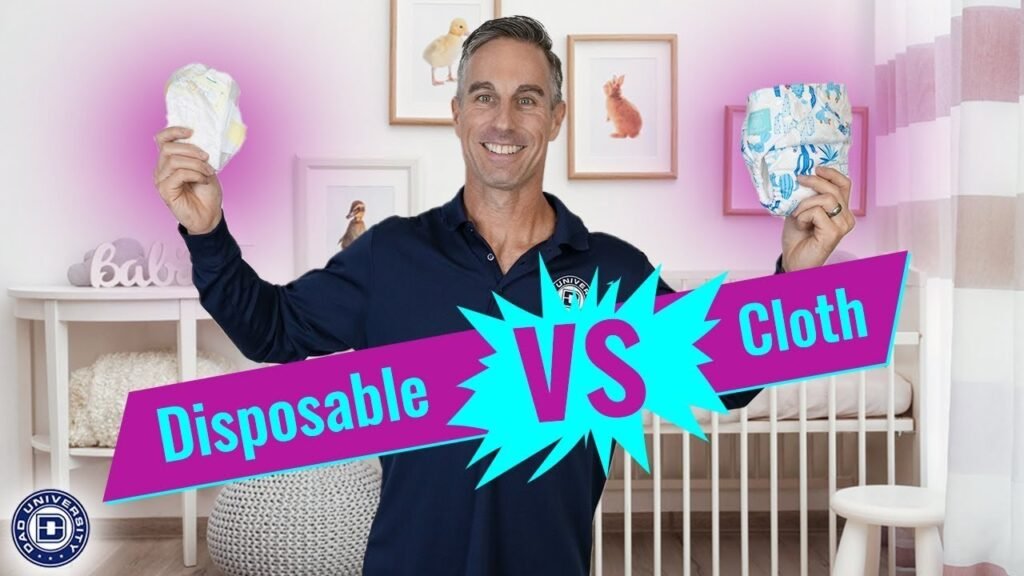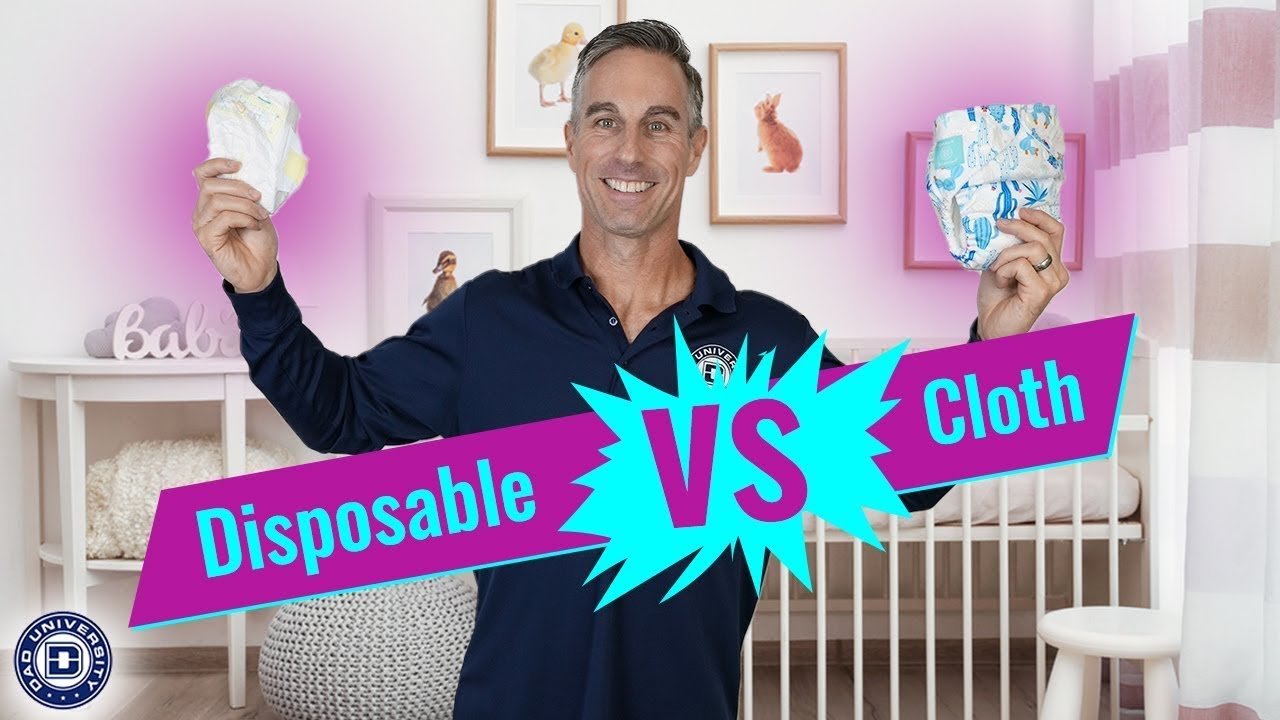In “The Debate Between Disposable Diapers and Cloth Diapers,” Dad University explores the ongoing battle between these two types of diapers. The video covers five key categories: cost, health, convenience, environmental impact, and comfort. Cloth diapers are known for their natural materials, breathability, and softness, which reduce the chances of skin irritation. On the other hand, disposable diapers offer convenience and high absorbency, although they may contain potentially harmful chemicals. These diapers contribute to landfills and can contaminate groundwater with human waste. Both types prioritize comfort, but cloth diapers are lightweight and soothing while disposable diapers are more absorbent. Ultimately, the choice between the two depends on personal preferences and priorities. Dad University encourages viewers to share their opinions and factors influencing their decision on which diaper type to choose.

Cost
Upfront cost of cloth diapers
When it comes to the cost of cloth diapers, there is a higher upfront investment. On average, cloth diapers can range from $5 to $25 per diaper, which adds up to about $300 to $1,000 for a full set of cloth diapers. Keep in mind that as your baby grows, you will need to purchase larger sizes. Additionally, there are some additional costs to consider, such as extra water, electricity, and detergents for your laundry machine. If you are not planning to wash the cloth diapers yourself and are considering a cloth diaper laundry service, you could potentially spend anywhere from $2,000 to $5,000 until your baby is potty trained. However, it’s important to note that once your child is potty trained, the cloth diapers can be stored and used for your next baby, given to someone else, or even sold to a second-hand store.
Spread-out cost of disposable diapers
On the other hand, disposable diapers have a spread-out cost over time. The cost of individual disposable diapers typically ranges from 20 cents to 40 cents per diaper. When looking at larger quantities, a 156 count pack of disposable diapers averages about $45. Disposable diapers will typically cost around $2,000 to $3,000 until your child is potty trained. While you do avoid the additional cost of water, power, and detergent for washing, there may be ongoing costs for items such as diaper pails or Diaper Genies. It’s important to consider your personal budget and financial situation when weighing the costs of cloth diapers versus disposable diapers.
Long-term savings with cloth diapers
While cloth diapers may have a higher upfront cost, they offer long-term savings. Since cloth diapers can be reused, you can save money in the long run, especially if you plan on having more than one child. By properly caring for and maintaining your cloth diapers, you can extend their lifespan and avoid the need to continuously purchase disposable diapers. This long-term investment can result in significant savings, especially when compared to the ongoing cost of disposable diapers.
Health
Materials used in cloth diapers
One of the advantages of cloth diapers is that they are typically made of more natural materials compared to disposable diapers. Cloth diapers are often made of materials such as cotton, bamboo, or hemp, which are gentle and soft to the touch. These natural fibers are less likely to cause irritation or allergic reactions on your baby’s sensitive skin. By using cloth diapers, you can provide a more comfortable and chemical-free option for your baby.
Breathability and reduced skin irritation
Cloth diapers are known for their breathability, allowing air to circulate and keep your baby’s skin dry. This can help prevent diaper rash and other skin irritations that can be caused by the prolonged exposure to moisture. Cloth diapers typically do not contain chemicals or fragrances that can potentially harm your baby’s skin. The natural materials used in cloth diapers are gentle and soothing, reducing the likelihood of skin irritation.
Chemicals in disposable diapers
While disposable diapers offer convenience, they may contain chemicals that could potentially be harmful. Many disposable diaper brands use absorbent chemicals to keep the diaper dry, which can irritate your baby’s skin. Additionally, some disposable diapers may contain fragrances or other additives that can cause allergic reactions or skin sensitivity. It is important to research and choose a disposable diaper brand that uses fewer chemicals and has a focus on your baby’s health and safety.
Convenience
Ease of use with disposable diapers
Disposable diapers are designed for convenience. They are easy to use and require minimal effort for changing and disposal. Unlike cloth diapers, you don’t have to spend time washing and drying them. Disposable diapers are ready to use straight out of the package, making them convenient for busy parents who may not have the time or resources for cloth diaper laundry. Simply take off the soiled diaper and throw it away.
Travel-friendly
Disposable diapers are especially convenient when it comes to travel. Whether you are going on a short trip or a long vacation, disposable diapers allow for hassle-free diaper changes on the go. You don’t have to worry about carrying around soiled cloth diapers or finding laundry facilities. Disposable diapers are readily available and provide a convenient solution for traveling with your baby.
Cleaning and laundry with cloth diapers
Cloth diapers require more time and effort for cleaning and laundry. After a diaper change, you will need to rinse or flush the waste from the cloth diaper before storing it until laundry time. When it comes to cleaning, cloth diapers need to be washed frequently to maintain hygiene. This means more loads of laundry, which can be time-consuming. However, it’s worth noting that there are cloth diaper laundry services available, which can make cloth diapers more convenient for those who prefer to outsource the washing process.
Environmental Impact
Eco-friendliness of cloth diapers
Cloth diapers are more eco-friendly compared to disposable diapers. They are usually made from natural fibers, such as cotton, bamboo, or hemp, which are biodegradable. This means that when cloth diapers are disposed of, they break down naturally without releasing harmful chemicals or toxins into the environment. By choosing cloth diapers, you can reduce your carbon footprint and contribute to a more sustainable future.
Biodegradability
Disposable diapers are a significant contributor to landfills, with over 18 billion disposable diapers ending up in landfills every year. These diapers take a long time to decompose and can contribute to environmental pollution. On the other hand, cloth diapers are biodegradable and break down naturally, reducing their impact on landfills. By using cloth diapers, you can minimize your contribution to the growing waste problem.
Water and power usage for washing
One consideration for cloth diapers is the amount of water and power used during the washing process. Cloth diapers require frequent washing to maintain hygiene, which results in increased water usage. However, it is possible to minimize water usage by using efficient washing machines, practicing water-conserving techniques, and reusing water for other purposes. Additionally, cloth diapers may require the use of power for washing and drying, which can add to the overall energy consumption. It’s important to find a balance and choose eco-friendly practices when using cloth diapers.
Contribution to landfills
Disposable diapers make up a significant portion of landfill waste. When disposed of, these diapers take a long time to decompose, contributing to environmental pollution. Additionally, when soiled diapers end up in landfills, they can introduce human feces to groundwater, posing potential health risks. By choosing cloth diapers, you can reduce your contribution to landfill waste and minimize the potential contamination of groundwater.
Comfort
Lightweight and soothing nature of cloth diapers
Cloth diapers are typically lightweight and made of natural fibers, providing a gentle and soothing experience for your baby. The softness of cloth diapers allows for breathability and comfort, ensuring that your baby’s skin stays dry and comfortable throughout the day. Cloth diapers offer a cozy and natural alternative to synthetic materials used in disposable diapers.
Absorbency of disposable diapers
Disposable diapers are known for their high absorbency, which keeps your baby’s skin dry. The absorbent materials used in disposable diapers quickly capture and lock away moisture, reducing the likelihood of diaper rash or discomfort. The increased absorbency of disposable diapers means less frequent changes, allowing your baby to stay comfortable for longer periods of time.
Potential irritation from chemicals
While cloth diapers are typically free from chemicals, disposable diapers may contain substances that can potentially irritate your baby’s skin. Some disposable diapers use absorbent chemicals or fragrances to enhance performance. These chemicals can cause allergic reactions or skin sensitivities in some babies. It is important to choose a disposable diaper brand that prioritizes the use of safe and hypoallergenic materials to minimize the risk of irritation.
Personal Preferences
Factors influencing the choice
When deciding between cloth diapers and disposable diapers, there are several factors that may influence your decision. Some factors to consider include cost, health benefits, convenience, environmental impact, and comfort. Each family’s priorities and circumstances are different, so it’s essential to weigh these factors and determine which ones are most important to you. By understanding your personal preferences and priorities, you can make an informed decision that aligns with your values and needs.
Individual priorities
Your individual priorities will play a significant role in choosing between cloth diapers and disposable diapers. It’s important to assess what matters most to you and your family. If cost savings and eco-friendliness are your top priorities, cloth diapers may be the better option. However, if convenience and ease of use are essential, disposable diapers may be a better fit. By considering your individual priorities, you can select the type of diaper that aligns with your values and lifestyle.
Conclusion
Choosing between cloth diapers and disposable diapers is a personal decision that depends on the unique needs and preferences of each family. Both options have their advantages and disadvantages in terms of cost, health benefits, convenience, environmental impact, and comfort. By considering these factors and evaluating your personal priorities, you can make an informed decision that meets the needs of your baby and your family. Whether you choose cloth diapers or disposable diapers, remember that the most important thing is to provide a safe, comfortable, and healthy environment for your baby’s growth and development.

